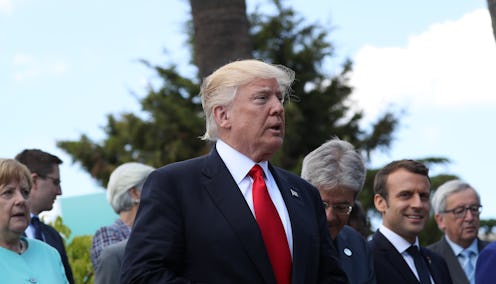News
The G7 Will Continue To Fight Climate Change With Or Without Trump

On Saturday, world leaders of the G7 released their recap of last week's summit in Taormina, Italy. The meeting covered a wide range of topics, including trade and, of course, climate change. Despite hesitancy from the U.S. president, the G7 declaration proved that the climate change fight will continue with or without Trump's cooperation.
According to NPR, the document published by the G7 nations at the end of their meeting included a brief section on climate change. In the statement, several countries signaled support for the Paris Climate Accord, which was approved by an overwhelming part of the international community during the Obama administration. The U.S., however, which was part of the accord originally, did not signal renewed support for the agreement.
The United States of America is in the process of reviewing its policies on climate change and on the Paris Agreement and thus is not in a position to join the consensus on these topics. Understanding this process, the Heads of State and of Government of Canada, France, Germany, Italy, Japan, and the United Kingdom and the Presidents of the European Council and of the European Commission reaffirm their strong commitment to swiftly implement the Paris Agreement, as previously stated at the Ise-Shima Summit.
President Trump himself acknowledged the delay in U.S. cooperation with a tweet. He tweeted on Saturday that his "final decision" on the Paris agreement would come this week. The tweet — and Trump's refusal to commit at the G7 summit — came after weeks of speculation that the Trump administration may choose to leave the Paris accord, which put forth international goals to mitigate climate change. Last month, Trump called the agreement "one-sided," suggesting that he may try to withdraw or renegotiate the terms of the deal.
The G7 summit declaration did not reveal any renegotiated terms, or the U.S.'s departure from the agreement. It merely signaled that the U.S. had not joined the consensus at that time. Still, the words of other G7 leaders seem to show that the climate change discussion may not have gone as planned. According to Buzzfeed, German chancellor Angela Merkel called the talks "very unsatisfactory."
At the same time, newly elected French president Emmanuel Macron reportedly said that President Trump listened to other countries' concerns that international equilibrium required the U.S.'s participation. The U.S. is one of the world's top emitters of greenhouse gases. According to the Union of Concerned Scientists, the U.S. has previously been ranked the world's second-highest emitter, behind China. With that much environmental impact, the U.S.'s actions can certainly have repercussions for the international community and the global environment.
Still, the U.S.-less consensus on climate change remains encouraging. It shows that the climate change discussion — and action — will continue on a global scale, even without Trump's participation. Under the non-binding Paris agreement from last year, participating countries committed to keeping global warming below 2 degrees Celsius by 2100. If Saturday's declaration is any indication, then that commitment will remain intact, for the most part.